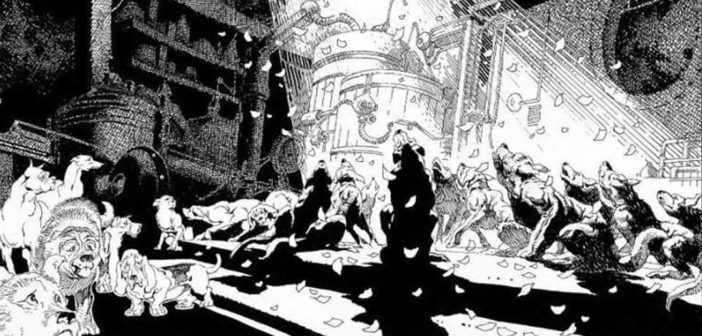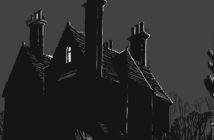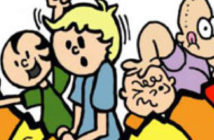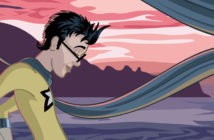The final volume of God the Dyslexic Dog brings the story of God the Dog (or is it Dog the God?) to it’s ever-impending close, thought not as neatly or concretely as I would have preferred. This entire trilogy, created and written by Brian and Philip Phillipson of Bliss on Tap Publishing and illustrated by comics veteran Alex Nino, tells an audacious tale that challenges the beliefs of mysticism and the facts of science. Audacious perhaps, but science and religion don’t operate on the same field: one demands faith while the other is an inquiry into fact and objectivity.
Regardless, volume three of God the Dyslexic Dog sees off Bacchus, the warring god of wine; Darwin, the entity seeking to dominate humanity by splicing gods and animals into soldiers; Nez, the dyslexic son of an animal psychic; Pandora, the failed keeper of the gods; and Dog, of course, who is the most powerful spirit of all. Don’t forget: he is the inversion of the cosmos itself.
God the Dyslexic Dog is a good book because of all of the challenging concepts and ideas it dares to take on. But God the Dyslexic Dog is also a troubled book because it takes on far too many challenging concepts and ideas. It’s difficult to divine why this is. Perhaps Dyslexic Dog is an example of a story that makes sense in the minds of the creators, but it’s translation into a finished product looses some of its resonance along the way.
I try to avoid comparisons of independent books with major works, but my troubles with the final chapter of God the Dyslexic Dog are similar to my problems with Grant Morrison’s The Invisibles. I simply don’t appreciate chaotic storytelling: there is always the ever-present sense that the creator is working solely for himself without regard to his projected audience. Stories of this sort either earn a devout cult following or general disapproval. This is common, for instance, with the films of David Lynch; something like Mulholland Drive.
I’m somewhere in the middle. I appreciate stories like this for their vision, but I can’t enjoy them on a visceral level of consumption. I loved the first volume of God the Dyslexic Dog, as it had a coherent path it was following. I liked the second because it faithfully continued the story, though it introduced even more elements that were unnecessary and confusing. The third brings in even more fresh elements, all of which weight down the entire book as it tries to wrap up.
There’s no dire reason to recap what happens in the book, as none of it will make any sense on its own. This saddens me; I feel that if the trilogy had at least one main protagonist that I could clearly identify, a hand of guidance would have been extended to readers as this tumultuous journey plays out.
Don’t misinterpret: the Phillipsons have a unique vision in their approach of comics storytelling, and Nino’s artwork is a wonderful compliment. But God the Dyslexic Dog is a little too ambitious and looses itself along the way. The best advice I can give is to definitely read the first volume, and if it’s appetizing, give the second and third a try. Sure, there will be some confusion, but at the very least it will pose an inquisitive challenge.
This comic book review originally appeared on Broken Frontier.




